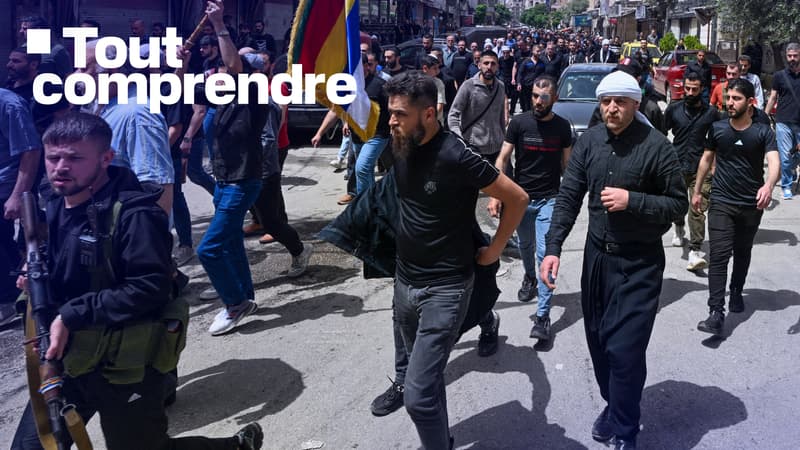Syrian minorities again victims of denominational violence. After the massacres committed by relatives of power against the Alauitas last March, it was the druse that were attacked this week.
Israel bombed this Friday, May 2, the surroundings of the Palace of the new Syrian President Ahmad al-Chareh in Damascus on Friday, May 2, renewing his warning to the Syrian authorities against any damage to this minority.
Who are the drusos?
The Druzes are one of the many ethnorellia minorities in Syria. Representing 3% of the population according to the information of the Quai d’Orsay, they live mainly in the south, especially in the province of Soueida, near Israel, but also in the pockets of the northwest and near the capital of Damascus.
Historically, this community of fierce warriors played a main role in the revolt against the French mandatory power over Syria a hundred years ago.
The Druzes adhere to the esoteric beliefs resulting from a branch of Shiite Islam, and are considered distrust of the Sunni extremist current from which the new Syrian authorities come. The Druzes make the reincarnation in particular a pillar of their religion and does not admit convert becoming their ranks.
Even if they only form a small part of the population of Syria, the Druzes have tried to preserve a certain freedom of action under the dictatorship of the fallen president Bashar al-Assad, and defend it fiercely against the new Islamist leaders.
· What are your relations with the new Syrian power?
The Druse community tried to stay away from the Syrian Civil War, born from the bloody repression of Bashar al-Assad of a popular uprising in 2011, and that devastated the country.
The Druzes joined mainly to the protection of their territories and greatly avoided the forced registration in the Syrian army. They have formed their own armed groups, the main ones of which are the “Dignity Movement” and the “Mountain Brigade”.
Before the fall of Bashar al-Assad, the province of Soueida, who complained about discrimination, had been the scenario of Antigan demonstrations for more than a year.
Since the fall of the Syrian dictator and the arrival of Ahmad Al-Chareh, former leader of the jihadist group HTS, certain groups have initiated negotiations with the new central power for the integration of combatants in the security forces. 400 Druz fighters joined the forces that depend on the Ministry of Defense and another 500 General Security Forces, said Rayane Maarouf, editor -in the scenario of the local site Suwayda 24.
What happened on Monday?
On Monday night, the fight broke out in Jaramana, a Damascus suburb with a Druse majority, in Sahnaya, 15 kilometers southwest of the capital, where Druze and the Christians live, and in Soueida, killing 102 dead in both fields, according to the Syrian Observatory for Human Rights (OSDH).
These fights were triggered by an attack by armed groups affiliated with power in Jaramana, after the transmission of an audio message attributed to a druzador and blasphemous court with respect to the prophet Muhammad.
The most influential Duse religious leader in Syria, Cheikh Hikmat al-Hajrin, denounced on Thursday night a “genocidal campaign” aimed at “civilians” of his community, after the denominational violence between armed groups linked to the fighters of power and Druzes who left more than 100 dead, according to a NGO.
This Friday at dawn, Israeli planes led a shot for “a neighboring sector of the Palacio de Ahmad al-Chareh,” according to the Syrian army.
“This is a clear message sent to the Syrian regime. We will not allow forces (Syrian) to be sent south of Damascus or threaten the Druse community,” Prime Minister Benjamin Netanyahu and his defense minister, Israel Katz, said.
Syrian authorities, which since then have reaffirmed their “firm commitment to protect all the components of the Syrian people, including the Druse community,” have challenged elements that escape their control. The agreements between the representatives of Druzes and the power had reduced calm on Tuesday night in Jaramana and then the next day in Sahnaya, where security forces were deployed.
Why will Israel defend the druse?
Israel arises as a protector of duses, justifying the presence of Druse minorities In Israel and in the Golán plateau, a Syrian territory occupied by the Hebrew state since the six-day war in 1967. In the fall of Bashar al-Assad, the Israeli army extended its positions on the goal, taking a damping zone created by the UN.
Since the arrival of the new Islamist power, Israel has multiplied the opening gestures with respect to the Syrian druzador. The Benjamin Netanyahu government sent them humanitarian plots and has twice authorized delegations of religious dignitaries to go to Israel for a pilgrimage, despite the state of war between the two countries.
Israel said he wanted to defend the druse in March, after skirmishes in the Damascus suburbs. However, Druzes’ dignitaries wanted to reaffirm their attachment to Syria’s unity.
According to the independent analyst interviewed by the AFP Michael Horowitz, Israel, “when placing itself as a protector of the Duse community, hopes that both be local allies, particularly in southern Syria, but also to weigh the balance at a time when the future of Syria remains uncertain.”
Source: BFM TV


